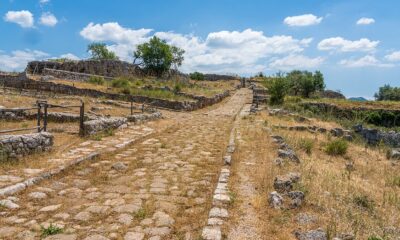Science
Iran’s President Declares Urgent Move of Capital Due to Water Crisis

In a significant development, Iranian President Masoud Pezeshkian announced on November 30, 2023, that Iran must relocate its capital city, Tehran, due to a severe and ongoing water crisis. The decision comes after decades of environmental challenges, including chronic water shortages exacerbated by climate change, industrial agriculture, and rapid urban population growth.
Tehran, home to approximately nine million residents and over 15 million in the surrounding metropolitan area, ranks as the third most populated city in the Middle East and the twenty-third largest globally. Despite its historical significance as the capital since 1786, the city is now facing dire circumstances, particularly as the region endures its sixth consecutive year of drought and the hottest summer in six decades.
Environmental Crisis Pressures Government Action
President Pezeshkian emphasized the urgency of the situation, stating, “When we said we must move the capital, we did not even have enough budget. If we had, maybe it would have been done. The reality is that we no longer have a choice; it is an obligation.” His remarks highlight the government’s struggle to address the environmental crisis that threatens public health and security.
The move to relocate Iran’s capital is unprecedented in modern history as no country has had to transfer its administrative center purely to escape a water crisis. Traditionally, capitals have moved for political or economic reasons; this situation marks a notable shift in priorities as environmental concerns take precedence.
According to the Global Water Forum, the current crisis disproportionately affects low-income urban residents, who are experiencing the brunt of water shortages. Iranian authorities have called on citizens to reduce water usage by 20 percent, yet household consumption accounts for only eight percent of the nation’s total water use, as reported by Al Jazeera.
Long-Term Challenges Ahead
Should the Iranian government decide to proceed with the capital relocation, experts suggest that the endeavor will likely take years, with any potential benefits from reduced water consumption arriving too late to alleviate the immediate crisis. The decision reflects a growing recognition of the urgent need for sustainable management of natural resources in the face of climate change.
As Iran navigates this critical juncture, the implications extend beyond geography to encompass broader environmental and social issues. The situation in Tehran serves as a stark reminder of the challenges faced by urban centers globally in adapting to the realities of climate change and resource scarcity.
-

 Technology5 months ago
Technology5 months agoDiscover the Top 10 Calorie Counting Apps of 2025
-

 Technology2 weeks ago
Technology2 weeks agoOpenAI to Implement Age Verification for ChatGPT by December 2025
-

 Health3 months ago
Health3 months agoBella Hadid Shares Health Update After Treatment for Lyme Disease
-

 Health3 months ago
Health3 months agoAnalysts Project Stronger Growth for Apple’s iPhone 17 Lineup
-

 Health3 months ago
Health3 months agoErin Bates Shares Recovery Update Following Sepsis Complications
-

 Technology5 months ago
Technology5 months agoDiscover How to Reverse Image Search Using ChatGPT Effortlessly
-

 Technology3 months ago
Technology3 months agoElectric Moto Influencer Surronster Arrested in Tijuana
-

 Technology2 months ago
Technology2 months agoDiscover 2025’s Top GPUs for Exceptional 4K Gaming Performance
-

 Technology5 months ago
Technology5 months agoMeta Initiates $60B AI Data Center Expansion, Starting in Ohio
-

 Technology5 months ago
Technology5 months agoRecovering a Suspended TikTok Account: A Step-by-Step Guide
-

 Health5 months ago
Health5 months agoTested: Rab Firewall Mountain Jacket Survives Harsh Conditions
-

 Lifestyle5 months ago
Lifestyle5 months agoBelton Family Reunites After Daughter Survives Hill Country Floods





















